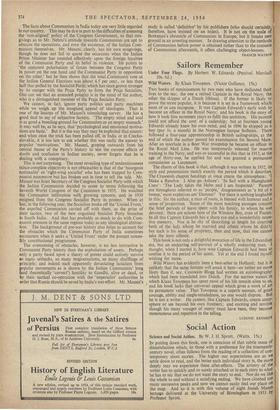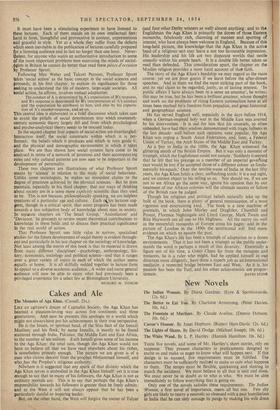Social Action
Science and Social Action. By W. J. H. Sprott. (Watts. 15s.) IN putting down this book, one is conscious of that subtle sense of dissatisfaction which, to those with a preference for the nineteenth• century novel, often follows from the reading of a collection of con temporary short stories. The higher our expectations are as we settle down to read, and the better each individual story is, the more deeply may we experience these after-effects. The artistry of the writer has so quickly and so surely attached us in each story to what he has to say that we do not want the story to end. Nor do we tike the whole to end without a satisfying ending. We have climbed too many successive peaks and now we cannot easily find our place 00 the map. And so it is with this volume of eight Josiah Mason lectures delivered at the University of Birmingham in 1953 by Professor Sprott.
It must have been a stimulating experience to have listened to these lectures. Each of them stands on its own intellectual feet: lucid in form,' thoughtful and provocative in content, unpretentious and graceful in style. Yet as a whole they suffer from the defects which seem inevitable in the publication of lectures carefully prepared or a listening audience and to last no longer than one hour. Never-
it i
eless, for anyone who wants an authoritative introduction to some f the more important problems now exercising the minds of sociol- gists in Britain he cannot do better than read these pieces d'occasion 'by Professor Sprott.
Following Max Weber and Talcott Parsons, Professor Sprott takes 'social action' as the basic concept in the social sciences and
Sroceeds, in his first chapter, to explain its significance for those eeking to understand the life of modern, large-scale societies. All Social action, he affirms, involves mutual adaptation: The conduct of A is determined by A's expectation of B's response,
and B's response is determined by B's interpretation of A's conduct and the expectation he attributes to him, and also by his expecta- tion of A's counter-response, and so on.
This central idea is elaborated in a brief discussion which takes care to avoid the pitfalls of social determinism into which nineteenth- century economic theory largely fell and from which psychological and psycho-analytical theory needs to be rescued today.
In the second chapter four aspects of social action are disentangled: interaction itself; the social constructs within which it is per- formed; the beliefs which it produces and which in turn guide it; and the physical and demographic environment in which it takes place. We are thus shown how social systems have come to be analysed in terms of a network of positions and their accompanying roles and why cultural patterns are now seen to be important in the development of personality.
These two chapters are illustrations of what Professor Sprott means by 'science' in relation to the study of social behaviour. Utilike some sociologists, he makes no immodest claims to the degree of precision achieved by the physical sciences. . But he does Maintain, especially in his, third chapter, that our ways of thinking "bout society are in a sense more explicitly scientific than they used. to be. This is not because, philosophically speaking, we are helpless creatures of a particular age and culture. Each (*his lectures sug- gests, though in a critical spirit, that some progress has been made towards a less subjective body of knowledge about man in society. In separate chapters on 'The Small Group,' Assimilation' and 'Deviance,' he proceeds to review recent theoretical contributions to knowledge in these fields and to discuss their practical significance in the real world of action.
That Professor Sprott sees little value in narrow, specialised studies for the future development of social theory is evident through- out and particularly in his last chapter on the sociology of knowledge. Not least among the merits of this book is that its material is drawn from many different 'disciplines'—psychology, anthropology., his- tory, economics, sociology and political science—and that it ranges Over a great variety of topics in each of which the author seems equally at home. It is all skilfully welded together in lecture form to appeal to a diverse academic audience. _ A wider and more general audience will now be able to enjoy what had previously been a privileged experience for a select few at Birmingham University.
RICHARD M. TITMUSS



































 Previous page
Previous page